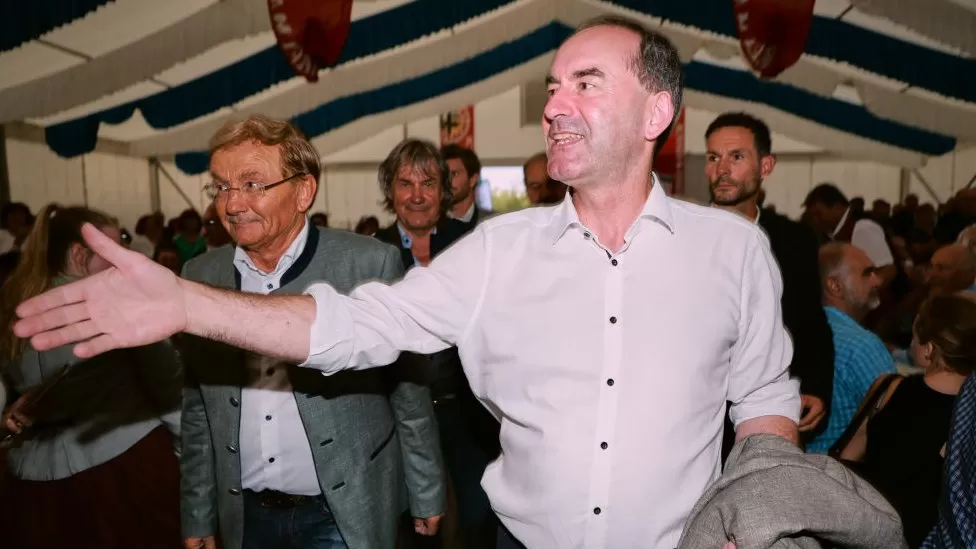Aiwanger under pressure for old anti-Semitic flyer

Despite denying writing the pamphlet mocking the Holocaust, the populist conservative leader has admitted having it 35 years ago.
In response to the controversy, Conservative Premier Markus Söder has asked Mr Aiwanger to answer 25 questions.
On 8 October, Bavaria holds key elections.
During his meeting with Freie Wahlers (Free Voters) on Tuesday, Mr. Söder called for full transparency in the coalition.
According to him, the Bavarian government had no place for anti-Semitism.
An emergency statement has been requested by the state parliament.
Chancellor Olaf Scholz has also asked for clarification following revelations about Mr Aiwanger’s schoolboy activities in the left-leaning Süddeutsche Zeitung at the weekend.
When Germans talk about anti-Semitism, Kevin Kühnert, general secretary of the chancellor’s centre-left party, makes it clear it requires “utmost vigilance and nobody should have a tactical relationship with it.”.
Initially, Mr Aiwanger claimed the leaflet was just part of a politically motivated media campaign against him. Later, he simply denied writing it, saying someone else did.
There was a fictitious competition to find “who is the biggest traitor to the Fatherland”, with a first prize of a “free flight through Auschwitz’ chimney”.
The Auschwitz extermination camp was at the center of the Nazi genocide of six million Jews during World War Two. A million of the 1.1 million people killed at Auschwitz were Jews.
As a teenager in Mallersdorf-Pfaffenberg in Lower Bavaria in the late 1980s, he carried “one or several” copies of the leaflet. It was unclear whether he had distributed the anti-Semitic materials himself, but he called them “disgusting and inhumane”. It is still unclear why the leaflets were in the schoolboy’s bag, except for vague speculation from Helmut Aiwanger that his brother was “possibly” trying to minimize harm. There has been no information released about the subsequent school disciplinary procedure.
The German press is asking whether a teenager’s brother’s immature scribblings should bring down a politician decades later. There is no doubt, however, that the pamphlet’s content is not trivial.
Even the far right cannot make jokes about concentration camps in Germany, where denying the Holocaust is a criminal offense.
Aiwanger is usually eloquent and known for his fiery, populist style, but in this case he has stayed tight-lipped, answering questions at one press conference with a brusque, “next question.”. The message has not been one of full disclosure or repentance.
Though he hasn’t expressed anti-Semitic views, he has flirted with rhetoric reminiscent of the far-right Alternative for Germany (AfD), including “taking back our country”.
The premier of Bavaria has now put pressure on him to respond to a situation that appears to be spiraling out of control.
Söder wants to remain in coalition with Mr Aiwanger’s party, but is furious that the row has erupted so soon before elections. He made snide jokes about Mr Aiwanger at a beer-hall election rally in Bavaria.
It is expected that Free Voters will win 11-14% of the vote in six weeks, but if their support falls, Mr Söder’s conservative Christian Social Union would be in trouble.
Bavarian leader’s ambitions to one day become German chancellor are already being dashed by poor poll numbers. The Free Voters would make it difficult for his party to win over the left-leaning Green Party, which is a hate figure for many Bavarian conservatives.
In the coming year, there will be important votes in eastern German states as well as a national election in 2025, so what happens in Bavaria will have a big impact on German politics.
In Bavaria, conservatives have a difficult time balancing the AfD’s record poll numbers of more than 20%.
Centrist voters may be scared off if they stray too far into nationalist territory, as Mr Aiwanger is alleged to have done. Right-wingers in Bavaria, however, believe they can defeat the AfD by mimicking its far-right rhetoric.
The newspaper’s handling of the story has also been scrutinized, along with the political future of the Free Voters leader.
Despite his denial being hidden behind a paywall, Süddeutsche Zeitung’s website reported that the deputy premier wrote the pamphlet.
